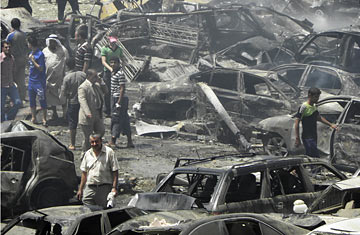
People gather after a truck-bomb attack outside the Ministry of Foreign Affairs in Baghdad
There are no quiet days in Iraq, but people had been hopeful. Things certainly seemed to be better than just two years ago, even if there really wasn't any calm. The air was full of sandstorms and anticipation. The village-crushing bombs outside Mosul were disturbing but not daily occurrences. Then roadside bombs started injuring civilians again, and reports started accumulating of more and more shooting. In Baghdad, the bombs started getting bigger. And then on Wednesday, a series of explosions rocked the capital, including an enormous explosion in front of the Foreign Ministry, which lies close to the Green Zone. Shattered glass and concrete littered the area.
At least 59 people were killed by the truck bomb at the Foreign Ministry and nearly 200 injured. Another 28 were killed and 96 injured by a truck bomb near the Finance Ministry. Meanwhile, two consecutive roadside bombs injured 10 on Palestine Street, and a third roadside bomb injured three in a mostly Shi'ite area of western Baghdad. Mortars lobbed into central Baghdad injured four in a Sunni area and two in a mixed area.
The Iraqi government is blaming a new alliance of religious extremists and Baathists for the violence, though it is hard to assess that claim at the moment. There is a feeling of disbelief among Iraqis as they see images of twisted metal and bodies on their TV sets. Many had thought that the bad times were finally behind them. The violence dramatically punctuates the fact that Iraq is amid a critical and highly charged political season — one in which the country's instabilities are conflating with the activity of political parties and accompanying militias, creating alliances as they head for elections. Two intertwined issues dominate the vote: security and the U.S. Expect the explosions to get bigger and the political noise louder as the country hurtles toward an election that is still months away.
The U.S. is a politician's gauge in the competition for who is the biggest Iraqi nationalist. Indeed, Prime Minister Nouri al-Maliki this week approved a referendum on the U.S.-Iraq Status of Forces Agreement (SOFA). If approved by parliament, it would be on the same ballot as candidates in the parliamentary elections set for January. SOFA has thus far reduced U.S. control over key areas — such as Baghdad's Green Zone — and prohibited U.S. forces from entering Iraqi cities in most circumstances. President Barack Obama has pledged to withdraw U.S. forces by December 2011. But if Iraqis vote down the agreement, U.S. troops will be out by January 2011.
For Iraqi politicians, getting the U.S. out would burnish their nationalism — even though the security situation remains fraught. It would be political suicide for the Iraqi government, at this point, to reverse itself and bring U.S. tanks back into cities. Al-Maliki celebrated SOFA's official inception on June 30, with U.S. forces relegated to their bases, as a kind of "national sovereignty day." Parades were staged and al-Maliki spoke of the reduced U.S. visibility as an Iraqi victory.
But a more recent date has some members of parliament and, especially, bureaucrats in the Oil Ministry concerned. That would be July 31, when parliament failed to pass a British-Iraqi security agreement. The British navy, which helped secure Iraq's gulf waters, then left the area. Now the oil-export terminals near Basra may be vulnerable — and the terminals facilitate over 70% of state revenue. The U.S. Navy has said it will pick up the slack, but eventually the Iraq navy must take responsibility. And it is still in training.
That kind of military unreadiness makes Iraqis nervous, as much as they want the U.S. out. Opinions on the street are heated and mixed. Some who want the U.S. to leave soon say a delay would postpone the probable power vacuum and accompanying bloodbath, which they hope will be short-lived. But that is the very reason others say it's not time for the U.S. to leave, because Iraqi security forces aren't ready and Iraqi politicians — pampered as they are patriotic — don't yet recognize that the country isn't prepared to go it alone.
The news seems to reinforce the sense of Iraqi dependence on the U.S. Every day U.S. dollars stand up Iraqi institutions. U.S. assistance has facilitated a major power-generator deal with GE. Provincial reconstruction teams are working locally to enhance agriculture. U.S. military press releases announce the graduation of Iraqi police- and army-academy classes.
And so there was political ambivalence when U.S. Commanding General Ray Odierno suggested this week that U.S. forces deploy to disputed territories in the north, a move not consistent with SOFA. Under his plan, U.S. troops would temporarily coordinate with the security forces there — and those security forces are at odds with one another. For it is in Kurdistan that Iraq may actually fissure. The central and regional Kurdish governments have been arguing over oil, land and money for years. Recently, they would have clashed if U.S. forces had not intervened.
Unlike SOFA, the fate of Kurdistan is an issue the government is not brave enough to put to a ballot. This week Iraq announced it would postpone a national referendum on the disputed territories even though Iraq's Kurds have been demanding one since 2006. Whether or not the Iraqis take up Odierno's suggestion, the country's dilemma about the U.S. is clear: While Iraq can't live with the U.S. military presence, it will have to learn to live without it fast.
